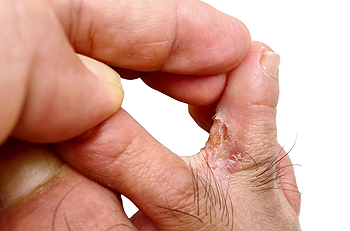
(908) 381-8160Berkeley Heights

Athlete’s foot, also known as tinea pedis, presents with an inflammatory fungal infection of the skin between the toes, soles of the feet, or on the heels. It can cause itchy, red, or raw skin, and sometimes wounds that are weepy. This is a contagious infection and can spread to the toenails, hands, and other people. Athlete's foot generally breeds under warm and moist conditions. It can easily be caught from contaminated surfaces, such as flooring in public gyms, locker rooms, and nail salons. Additionally, it can be passed between people from shared clothes or towels that have been in contact with infected feet. Athlete’s foot can be hard to cure, and it can recur. If you think you have athlete’s foot, see a podiatrist as soon as possible for the correct treatment options.
Athlete’s Foot
Athlete’s foot is often an uncomfortable condition to experience. Thankfully, podiatrists specialize in treating athlete’s foot and offer the best treatment options. If you have any questions about athlete’s foot, consult with Dr. Janet Leicht from New Jersey. Our doctor will assess your condition and provide you with quality treatment.
What Is Athlete’s Foot?
Tinea pedis, more commonly known as athlete’s foot, is a non-serious and common fungal infection of the foot. Athlete’s foot is contagious and can be contracted by touching someone who has it or infected surfaces. The most common places contaminated by it are public showers, locker rooms, and swimming pools. Once contracted, it grows on feet that are left inside moist, dark, and warm shoes and socks.
Prevention
The most effective ways to prevent athlete’s foot include:
Symptoms
Athlete’s foot initially occurs as a rash between the toes. However, if left undiagnosed, it can spread to the sides and bottom of the feet, toenails, and if touched by hand, the hands themselves. Symptoms include:
Diagnosis and Treatment
Diagnosis is quick and easy. Skin samples will be taken and either viewed under a microscope or sent to a lab for testing. Sometimes, a podiatrist can diagnose it based on simply looking at it. Once confirmed, treatment options include oral and topical antifungal medications.
If you have any questions, please feel free to contact our office located in Berkeley Heights, NJ . We offer the newest diagnostic and treatment technologies for all your foot care needs.